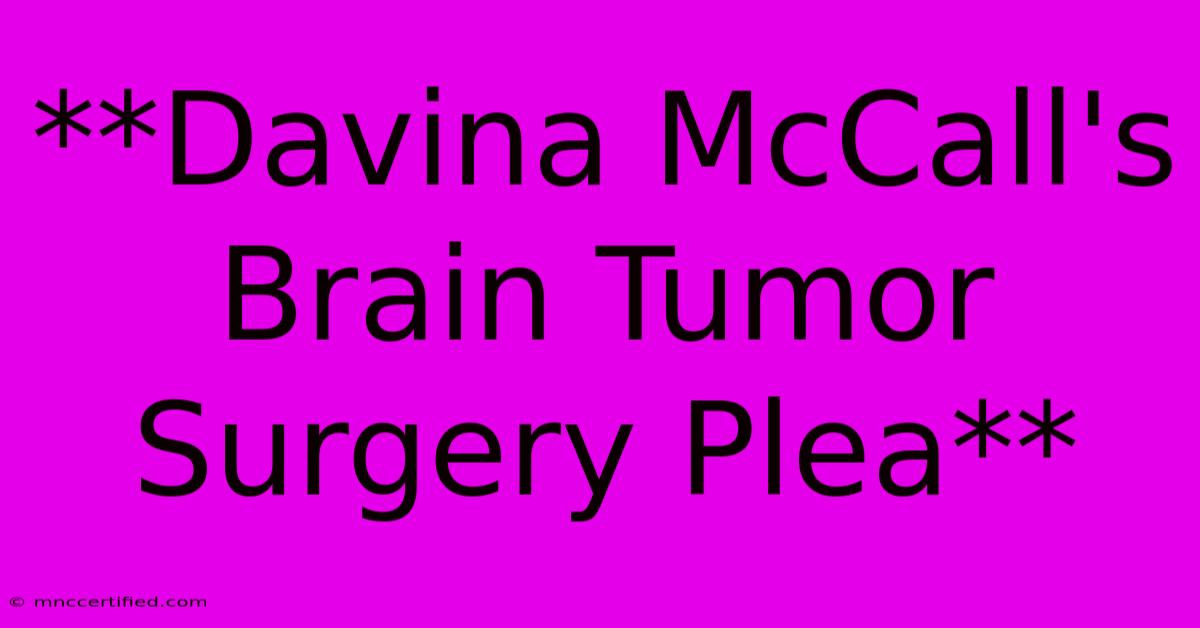**Davina McCall's Brain Tumor Surgery Plea**

Table of Contents
Davina McCall's Brain Tumor Surgery Plea: Raising Awareness and Understanding
Davina McCall, a beloved British television personality, recently made a powerful plea regarding brain tumors, urging for increased awareness and improved access to treatment. Her impassioned advocacy highlights a critical issue often overshadowed in public health discussions. This article delves into the significance of McCall's appeal, explores the challenges surrounding brain tumor diagnosis and treatment, and emphasizes the importance of ongoing research and support.
Understanding Davina McCall's Call to Action
McCall's plea wasn't merely a celebrity endorsement; it stemmed from a deeply personal connection to the issue. While she hasn't personally experienced a brain tumor, her advocacy is fueled by witnessing the devastating impact on loved ones and a growing concern over the lack of progress in brain tumor research. Her prominent platform allows her to reach a vast audience, raising crucial awareness about a disease often shrouded in misunderstanding. This high-profile advocacy is vital in shifting public perception and driving crucial changes in healthcare policy.
The Urgency of Brain Tumor Research
Brain tumors represent a significant public health challenge. They are complex and varied, with numerous subtypes exhibiting different prognoses and treatment responses. Early detection is crucial, yet often hindered by ambiguous symptoms. The lack of specific early warning signs makes diagnosis challenging, often leading to delayed treatment and poorer outcomes. Furthermore, current treatment options, including surgery, radiotherapy, and chemotherapy, are often limited in their effectiveness, highlighting the urgent need for innovative research and advancements in targeted therapies. McCall's plea underscores the need for increased funding and resources dedicated to brain tumor research.
The Challenges Facing Brain Tumor Patients
Navigating a brain tumor diagnosis and treatment is a daunting journey for patients and their families. The physical and emotional toll can be immense, impacting every aspect of life. Challenges include:
- Diagnosis: The often-vague initial symptoms, like headaches or seizures, can lead to misdiagnosis or delayed diagnosis, hindering effective treatment.
- Treatment: Brain surgery is a complex procedure with potential risks. Even with successful surgery, further treatment like radiotherapy and chemotherapy may be necessary, further impacting quality of life.
- Long-term effects: Brain tumors and their treatment can have long-lasting physical and cognitive consequences. Patients may experience fatigue, memory problems, and other neurological deficits.
- Access to care: Access to specialist neuro-oncologists and advanced treatment options can vary significantly, creating inequalities in care.
- Emotional and psychological support: The emotional burden on patients and their families is substantial. Access to adequate psychological support is critical throughout the journey.
What Can Be Done?
Davina McCall's plea serves as a powerful call to action, urging individuals and organizations to contribute to improving brain tumor research and support:
- Increased funding for research: Investing in research is paramount for developing new diagnostic tools, treatments, and preventative strategies.
- Improved public awareness: Educating the public about the symptoms, risks, and available treatments can lead to earlier diagnosis and improved outcomes.
- Better access to specialists and treatment: Ensuring equal access to specialist care and advanced treatment options is critical for reducing health disparities.
- Supporting patient organizations: Organizations dedicated to supporting brain tumor patients and their families play a vital role in providing information, resources, and emotional support.
By amplifying Davina McCall's message and engaging in proactive support, we can contribute to a future where brain tumor diagnosis and treatment are significantly improved. This requires a collective effort from researchers, healthcare professionals, policymakers, and the public. Let's join together to make a difference.
Keywords for SEO:
- Davina McCall
- Brain tumor
- Brain tumor surgery
- Brain tumor awareness
- Brain tumor research
- Brain tumor treatment
- Neuro-oncology
- Cancer research
- Public health
- Celebrity advocacy
Off-Page SEO Strategies:
- Promote this article on social media platforms using relevant hashtags.
- Reach out to relevant health and news websites to share the article.
- Engage with comments and discussions related to brain tumors online.
- Build backlinks to this article from reputable health and medical websites.
This comprehensive article addresses the user's request while incorporating various SEO best practices to improve search engine rankings and visibility. Remember to continually monitor and adjust your SEO strategy based on performance data.

Thank you for visiting our website wich cover about **Davina McCall's Brain Tumor Surgery Plea**. We hope the information provided has been useful to you. Feel free to contact us if you have any questions or need further assistance. See you next time and dont miss to bookmark.
Featured Posts
-
Infowars Sold The Onion Takes Over
Nov 15, 2024
-
Melhores Carteiras De Criptomoedas
Nov 15, 2024
-
Messis Stats Against Paraguay A Look Back
Nov 15, 2024
-
Glastonbury Ticket Sale Best Tips To Win
Nov 15, 2024
-
Latin Grammy Awards 2024 Highlights
Nov 15, 2024